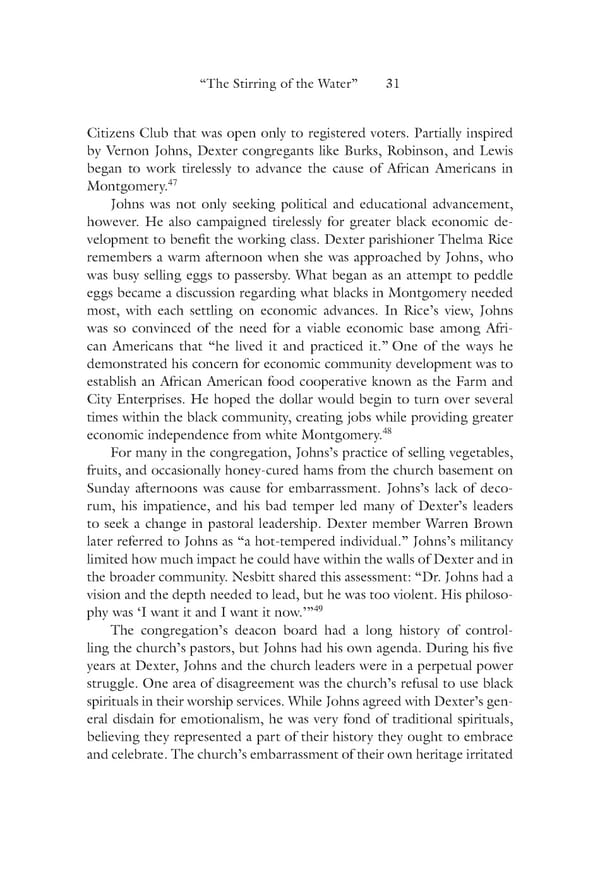“The Stirring of the Water” 31 Citizens Club that was open only to registered voters. Partially inspired by Vernon Johns, Dexter congregants like Burks, Robinson, and Lewis began to work tirelessly to advance the cause of African Americans in Montgomery.47 Johns was not only seeking political and educational advancement, however. He also campaigned tirelessly for greater black economic de- velopment to benefit the working class. Dexter parishioner Thelma Rice remembers a warm afternoon when she was approached by Johns, who was busy selling eggs to passersby. What began as an attempt to peddle eggs became a discussion regarding what blacks in Montgomery needed most, with each settling on economic advances. In Rice’s view, Johns was so convinced of the need for a viable economic base among Afri- can Americans that “he lived it and practiced it.” One of the ways he demonstrated his concern for economic community development was to establish an African American food cooperative known as the Farm and City Enterprises. He hoped the dollar would begin to turn over several times within the black community, creating jobs while providing greater 48 economic independence from white Montgomery. For many in the congregation, Johns’s practice of selling vegetables, fruits, and occasionally honey-cured hams from the church basement on Sunday afternoons was cause for embarrassment. Johns’s lack of deco- rum, his impatience, and his bad temper led many of Dexter’s leaders to seek a change in pastoral leadership. Dexter member Warren Brown later referred to Johns as “a hot-tempered individual.” Johns’s militancy limited how much impact he could have within the walls of Dexter and in the broader community. Nesbitt shared this assessment: “Dr. Johns had a vision and the depth needed to lead, but he was too violent. His philoso- 49 phy was ‘I want it and I want it now.’” The congregation’s deacon board had a long history of control- ling the church’s pastors, but Johns had his own agenda. During his five years at Dexter, Johns and the church leaders were in a perpetual power struggle. One area of disagreement was the church’s refusal to use black spirituals in their worship services. While Johns agreed with Dexter’s gen- eral disdain for emotionalism, he was very fond of traditional spirituals, believing they represented a part of their history they ought to embrace and celebrate. The church’s embarrassment of their own heritage irritated
 Becoming King: Martin Luther King Jr. Page 51 Page 53
Becoming King: Martin Luther King Jr. Page 51 Page 53